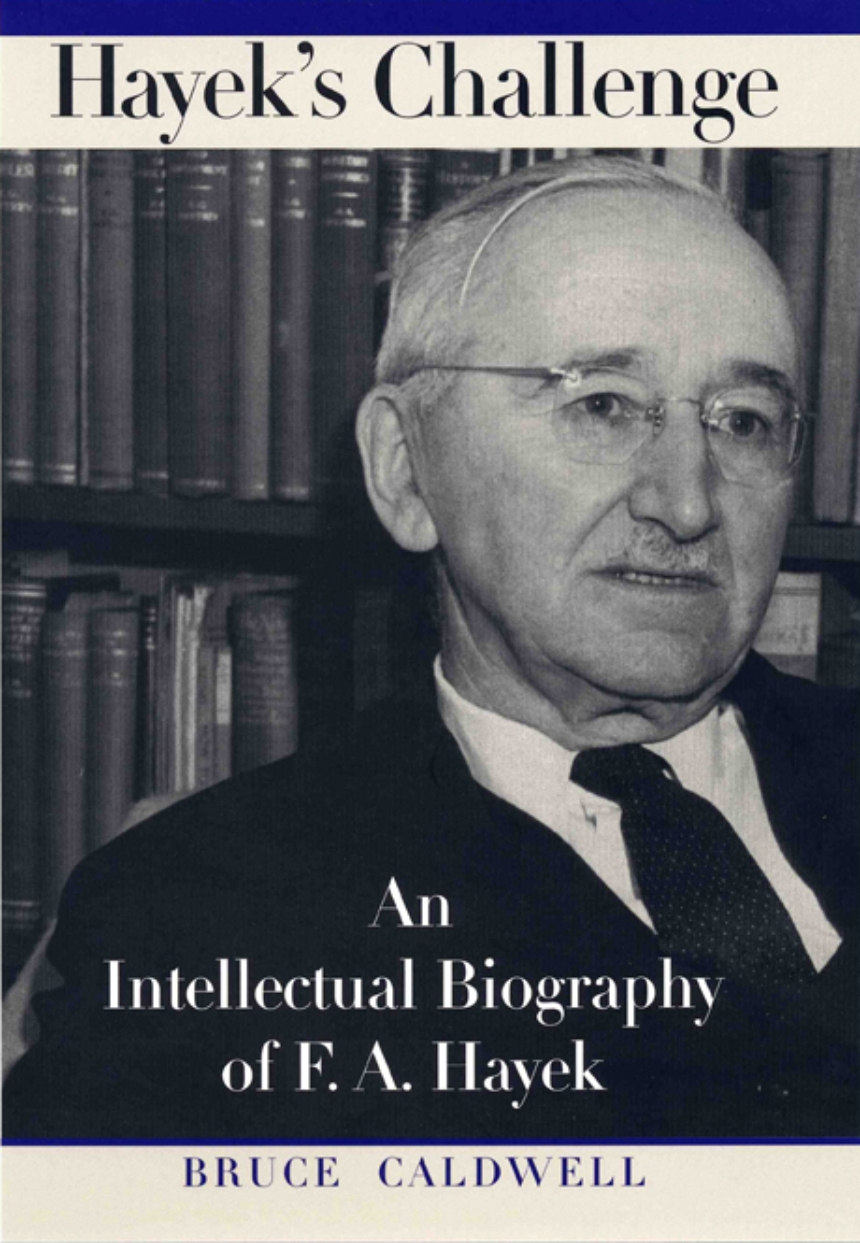Hayek’s Challenge
An Intellectual Biography of F.A. Hayek
Friedrich A. Hayek is regarded as one of the preeminent economic theorists of the twentieth century, as much for his work outside of economics as for his work within it. During a career spanning several decades, he made contributions in fields as diverse as psychology, political philosophy, the history of ideas, and the methodology of the social sciences. Bruce Caldwell—editor of The Collected Works of F. A. Hayek—understands Hayek’s thought like few others, and with this book he offers us the first full intellectual biography of this pivotal social theorist.
Caldwell begins by providing the necessary background for understanding Hayek’s thought, tracing the emergence, in fin-de-siècle Vienna, of the Austrian school of economics—a distinctive analysis forged in the midst of contending schools of thought. In the second part of the book, Caldwell follows the path by which Hayek, beginning from the standard Austrian assumptions, gradually developed his unique perspective on not only economics but a broad range of social phenomena. In the third part, Caldwell offers both an assessment of Hayek’s arguments and, in an epilogue, an insightful estimation of how Hayek’s insights can help us to clarify and reexamine changes in the field of economics during the twentieth century.
As Hayek’s ideas matured, he became increasingly critical of developments within mainstream economics: his works grew increasingly contrarian and evolved in striking—and sometimes seemingly contradictory—ways. Caldwell is ideally suited to explain the complex evolution of Hayek’s thought, and his analysis here is nothing short of brilliant, impressively situating Hayek in a broader intellectual context, unpacking the often difficult turns in his thinking, and showing how his economic ideas came to inform his ideas on the other social sciences.
Hayek’s Challenge will be received as one of the most important works published on this thinker in recent decades.
Caldwell begins by providing the necessary background for understanding Hayek’s thought, tracing the emergence, in fin-de-siècle Vienna, of the Austrian school of economics—a distinctive analysis forged in the midst of contending schools of thought. In the second part of the book, Caldwell follows the path by which Hayek, beginning from the standard Austrian assumptions, gradually developed his unique perspective on not only economics but a broad range of social phenomena. In the third part, Caldwell offers both an assessment of Hayek’s arguments and, in an epilogue, an insightful estimation of how Hayek’s insights can help us to clarify and reexamine changes in the field of economics during the twentieth century.
As Hayek’s ideas matured, he became increasingly critical of developments within mainstream economics: his works grew increasingly contrarian and evolved in striking—and sometimes seemingly contradictory—ways. Caldwell is ideally suited to explain the complex evolution of Hayek’s thought, and his analysis here is nothing short of brilliant, impressively situating Hayek in a broader intellectual context, unpacking the often difficult turns in his thinking, and showing how his economic ideas came to inform his ideas on the other social sciences.
Hayek’s Challenge will be received as one of the most important works published on this thinker in recent decades.
Read the introduction.
500 pages | 6 x 9 | © 2003
Economics and Business: Economics--General Theory and Principles, Economics--History
Political Science: Political and Social Theory
Reviews
Table of Contents
Acknowledgments
Introduction
I. The Austrian School and Its Opponents—-Historicists, Socialists and Positivists
1. Menger’s Principles of Economics
2. The German Historical School
3. The Methodenstreit
4. Max Weber and the Decline of the Historical School
5. Positivism and Socialism
II. Hayek’s Journey
6. Hayek in Vienna
7. Monetary Theory and Methodology
8. Hayek at the London School of Economics
9. Some Methodological Debates of the 1930s
10. "Economics and Knowledge" and Hayek’s Transformation
11. The Abuse of Reason Project
12. Individualism and the Sensory Order
13. Rules, Orders and Evolution
III. Hayek’s Challenge
14. Journey’s End—-Hayek’s Multiple Legacies
15. Epilogue: A Meditation on Twentieth-Century Economics
Appendixes
Bibliography
Index
Introduction
I. The Austrian School and Its Opponents—-Historicists, Socialists and Positivists
1. Menger’s Principles of Economics
2. The German Historical School
3. The Methodenstreit
4. Max Weber and the Decline of the Historical School
5. Positivism and Socialism
II. Hayek’s Journey
6. Hayek in Vienna
7. Monetary Theory and Methodology
8. Hayek at the London School of Economics
9. Some Methodological Debates of the 1930s
10. "Economics and Knowledge" and Hayek’s Transformation
11. The Abuse of Reason Project
12. Individualism and the Sensory Order
13. Rules, Orders and Evolution
III. Hayek’s Challenge
14. Journey’s End—-Hayek’s Multiple Legacies
15. Epilogue: A Meditation on Twentieth-Century Economics
Appendixes
Bibliography
Index
